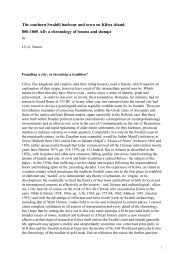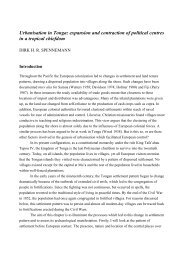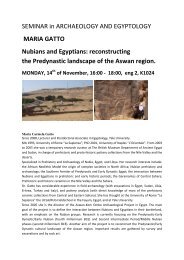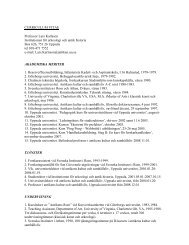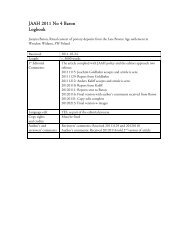Beowulf - Institutionen för arkeologi och antik historia
Beowulf - Institutionen för arkeologi och antik historia
Beowulf - Institutionen för arkeologi och antik historia
You also want an ePaper? Increase the reach of your titles
YUMPU automatically turns print PDFs into web optimized ePapers that Google loves.
45 Post tenebras noctis stellarum lumina subdens<br />
Lucifer ut radiis, sic mihi mente nitis<br />
Ut recreat mundum veniens lux solis ab ortu<br />
Inlustrant animum sic tua verba meum.<br />
71 Hi celebrem memorent, illi te lege sagacem:<br />
Ast ego te dulcem semper habebo, Lupe. (END)<br />
(Venantius, Book VII, poem 8.)<br />
So am I, exhausted by the mighty troubles of the heat, restored by the spring,<br />
when I know that you are safe. Oh, Lupus’ sweet name to me, always worth<br />
repeating, which is written on the page of my heart, a man who, once included<br />
there on the tablets of sweetness, the indestructible coffer of my chest shall keep.<br />
As the morning star with its rays after the darkness of the night dominates the<br />
light of the stars, so do you shine in my mind, and as the light of the sun recreates<br />
the world when it rises, so do your words enlighten my heart.<br />
Here they talk of your celebrity, there of your sagacity in law, but I shall always<br />
love you, Lupus.<br />
Our difficulties in understanding the poems are accentuated by the fact that modern<br />
scholars who take an interest in Venantius Fortunatus tend to be very familiar with<br />
the literary eloquence of the quotations and the classical tradition, handed down to<br />
us in a vast number of sources, but to be less aware of the growing archaeological<br />
material constantly changing or adding to our view of the Germanic ideal. These<br />
difficulties are still intriguing and we may therefore benefit from the relief provided<br />
also by relatively extreme interpretations of the poems.<br />
94<br />
The Poem to Sigibert and Brunhild<br />
The cultural complexity in Venantius is exemplified by the very first two of his poems to<br />
Merovingians, namely those with which he introduced himself officially at Sigibert’s<br />
court in connection with the royal wedding. In recent decades the poems have been<br />
discussed by Rogers (1969) and by George (1992). The first poem is an epithalamium<br />
to Sigibert and his Visigoth bride Brunhild, a bedside poem as it were, to be recited<br />
officially at the wedding. The rationale of such a poem is to point out the raptures of<br />
love, not least its erotic joys and of course the happy and highly valuable result that may<br />
come of these pleasures in the nuptial bed. Venantius makes use of the genre in a<br />
surprisingly heathen way, which must—in the context of a Christian royal wedding—<br />
be seen as a relatively light-hearted flirtation with Pagan cult and rites in connection with<br />
the reproduction of the aristocracy. Rogers comments upon this poem with a clear eye<br />
for its impersonal attitude and seeming lack of deeper insight into matters which for<br />
most people are too serious to be treated so superficially and schematically.



